特殊句式(倒装句)
特殊句式(倒装句)
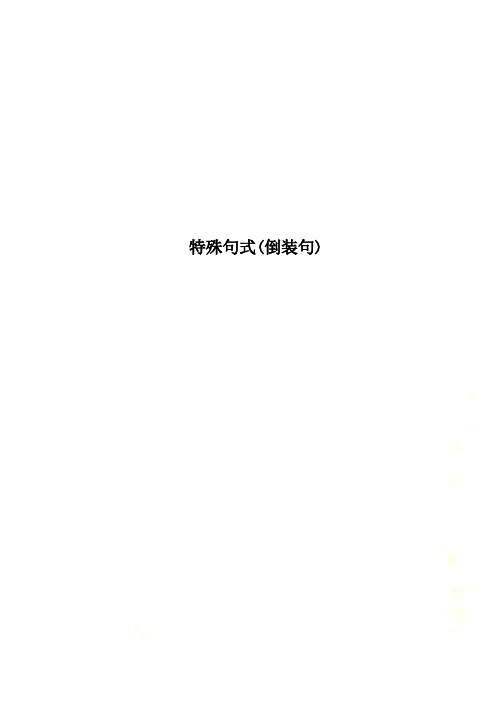
特殊句式(倒装句)高考英语语法复习专题------ 特殊句式一、考点聚焦倒装句部分倒装1. 否定意义的词或短语,位于句首,需部分倒装。
如否定词no, not, never;半否定词hardly, seldom, scarcely, barely, rarely, little, few;no合成的代词或副词nobody, nothing, nowhere;否定的短语not until, by no means, in no way, in no time, under no circumstances。
No word did he say before he left.Never had I heard or seen such a thing.Little did I know about it.Nowhere will you find better roses than theses.Not until he went abroad did he know the truth.By no means shall we give up.2. not only (merely, alone, simply)…(but) also 连接两个并列分句,前一分句需倒装。
Not only did we lose our money, but we also came close to losing our lives.Not simply is this book interesting but alsoinstructive.注意:Not only you but also I(连接并列主语不倒装)will attend the meeting.3. neither…nor连接两个并列分句,前后两个分句都倒装。
Neither did they write nor did they telephone. Neither is he wrong nor are you.Neither could I help you, nor could he.Neither French nor German do I know.Neither on Saturday nor on Sunday do we have lessons.注意:Neither you nor I(连接并列主语不倒装)like this book.4. Only + 状语,位于句首,需部分倒装。
英语特殊句式--倒装句

else in the world can you see (世界上没有其他地方你能看见) such a 14.Nowhere ________________ wonderful sight. (see)
will we be the first (one) (我们不会成为第一个) to use nuclear 15. Under no circumstances________________ weapons. (first) moving film was it 这是一部如此感人的电影)that they were all lost in thought 16.Sucha________________( after it was over. (moving) can we finish the work ahead of time (我们才能提前 17.Only by seizing every minute________________ 完成工作). (finish) Child as he is 18. _________________________( 虽然他是个孩子), he is always thinking of
• • • • • • • • • • • • •
部分倒装 1、so, neither, nor 开头: (1)So+ 助动词 + 主语(前句是肯定句) He devoted his life to abstract research, so did that scientist. 他把一生都致力于抽象理论研究上去了,那位科学家也是这样。 (2)neither / nor +助动词 + 主语(前句是否定句) He has never been abroad, neither / nor has Jim. (3)Neither / nor + 助动词 + 相同主语 I haven’t heard from him for a long time, neither / nor have I seen him. 我很久未收到他的信,也没有见到过他。 注意:“so + 主语 + 助动词”重复强调上句内容,不是倒装。 —John does better in English than his sister, 约翰的英语学得比他妹妹好。 —So he does, 确实是这样。
特殊句式之——倒装
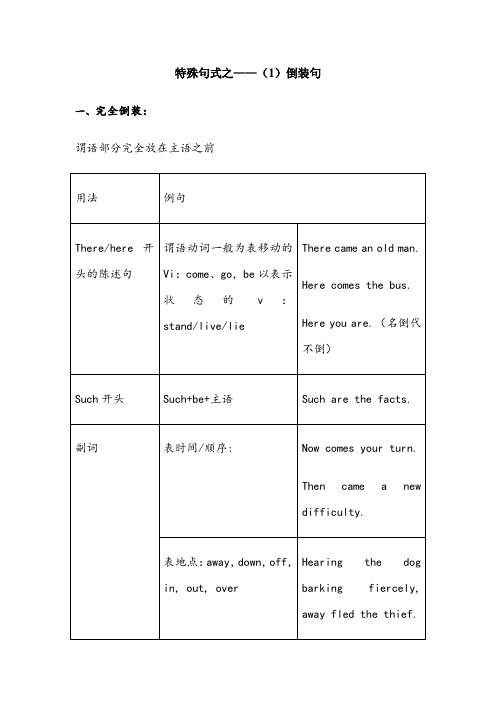
特殊句式之——(1)倒装句一、完全倒装:谓语部分完全放在主语之前练习:1.For a moment nothing happened. Then___all shouting together.A.voices had come voicesB. would come voices come2.Hearing the dog barking fiercely, away___.A.fleeing the thief fleeing the thiefB.the thief was fleeing the thief二、部分倒装只把be动词、助动词、情态动词提到主语前,叫部分倒装。
注意:so+sb/sth.+助动词某人、某物确实如此Eg. Helen likes music,so she does.练习:by increasing the number of doctors by 50 percent___ properly in this hospital.A.can be the patients treated the patients be treated C.the patients can be treated can be the patientsonce___ to Michael that he could one day become a top student in his class.it did occur occurred it occur3.——I reminded you not to forget the appointment.——____.A.So you didB. So I do not did you do I三、形式倒装(强调作用)将强调内容提前,主谓不倒装练习:____,his idea was accepted by all the people at the meeting.A.Strange as might it soundB.As it might sound strangeC.As strange it might soundD.Strange as it might sound四、倒装句综合练习题:1.(2014陕西)No sooner___stepped on the stage than the audience broke into thunderous applause.A.had Mo Yan Yan had Mo Yan Yan has2.(2016天津十二区县二联)So buried___ in doing her homework that she didn’t notice it got dark outside.A.was sheB. she was she did3.(2015天津十二区县一联)Only when our project has been approved of by the committee ____to carry it out.A.did we start started we start start4.(2015天津七校四月联考)Not until I had watched the football match between Brazil and Germany_____ to bed last night.A.I went had gone I gone I gone5.(2015天津南开中学高三五测)Little ____ about her own safety, thought she was in great danger herself.A.did Marry care did care does care Mary care6.(2015陕西质检二)It is all your fault. By no means____ left alone at home.A.should a two-year-old beB. a two-year-old should be be a two-year-old a two-year-old should7.(2016江苏苏锡常镇二模)____on mobile phones for storinginformation that people are unable to remember basic things.A.Such is the dependence dependence doesthey are dependent do they depend8.(2015天津红桥区一模)It is known that water is not an endless resource;_____can it be made once more, so we should save and protect it.A.so9.(2016天津高考压轴卷)Into the dark apartment_____,who was quite surprised when everyone shouted “Happy birthday!”A.did David walk did walk walked David10.(2014重庆市重庆一中高三下学期第一次月考,29)— Are the rest of our guests here—Not yet…. Look, there _____!A. come theyB. they cameC. do they comeD. they come11.(2014吉林省实验中学高三第一次模拟,29)______ you eat the correct food ____ be able to keep fit and stay healthy.A. Unless; will youB. Only if; you willC. Only if; will youD. Unless; you will12.(河南省中原名校2013届高三上学期期中联考,34)It's too messy in your room. Look, by the bed ____ a pile of dirty clothes.A. are liedB. layC. are lyingD. lies13.(2015天津,3)Only when Lily walked into the office______that she had left the contract at home.realized she realized has realized she realize 14.(2012天津, 6) Only after Mary read her composition the second time_____ the spelling mistake.A. did she noticeB. she noticedC. does she noticeD. she has noticed15.(2017和平区高三年级模拟考试)I’m my illness, I would have come and lent you a helping hand.Were it not B. If it were not it not been it has not been16.(2017十二区县高三年级模拟考试)Nowadays many teenagers often take their parents’ love for granted. Seldom____what they should return them when they are old.they think think they they17.(11福建)—It’s nice.Never before ____such a special drink!—I’m glad you like it.A. I have hadB. I hadC. have I hadD. had I18. (10江西)Not until he left his home to know how important the family was for him.A. did he beginB. had he begunC. he beganD. he has begun19. (10四川)We laugh at jokes, but seldom about how they work.A. we thinkB. think weC. we do thinkD. do we think20. (09重庆)Unsatisfied with the payment, he tookthe job just to get some work experience.A. though was heB. though he wasC. he was thoughD. was he though。
特殊句式 倒装
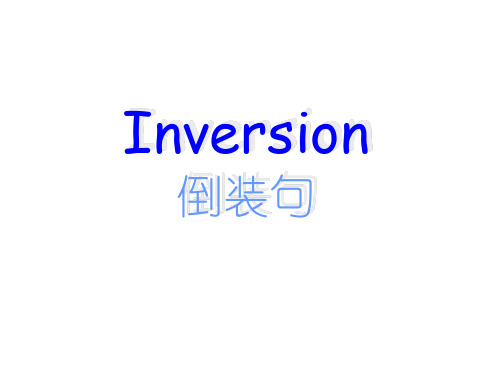
she taken that examination 假如她参 1. Had _________________________, 加考试 she could have passed it. it to rain tomorrow 如果明天下雨的 2. Were ____________________ 话, we would put off the match till next Monday. Should it rain tomorrow
Inversion
倒装句
倒装的分类
1. 全部倒装: 主语与谓语动词倒装 结构:谓语动词+ 主语 The rain fell down. Down fell the rain. 2. 部分倒装: 主语 与 助动词(情态动词、 系动词) 倒装 结构:助动词+ 主语+谓语动词 I have never heard such a thing. Never have I heard such a thing.
4.虚拟条件从句中包含有were, had, should,有时可把if省略掉,但这时要把 were, had, should放在主语前面。
1. If they had time, they would certainly come and help us.
2. If I were you, I would do the work better.
他父亲也是。 So is his father.
2) You can drive a car. 我也会. 我也去过。
So can I.
So have I. So she has.
3) She has been to Beijing.
※ So +主语+ 助动词.
特殊句式倒装句

7.当“so/such ...that...”中“so/such”位于句首,表示“如此... 以至于...”, 引起部分到装.前倒后不倒! 例: So nice is she that everyone likes her.
8.so+形容词/副词 或者such 位于句首,引起部分倒装。 例如: So happy did he look just then. Such is he .
谢谢
9. 在 由 if 引 导 的 虚 拟 语 气 的 从 句 中 , 若 有 were/should/had等词时,可将if省略,将刚刚那三类词 提前到主语前面,引起部分倒装。
If I were you,I would try again. 改成:Were I you,I would try again. ______ earn money, I would live better. A I did B I should C Did I D Should I
10.方式副词well或频度副词often, many a time, always, once, every two hours置于句首的句子。(有时候也可以不用倒装) 1)Often did I remind him not to do that. 2)Many a time has he made the same mistake.
部分倒装
(将谓语的一部分置于主语之前,如助动词、连系动词 或情态动词,引起部分倒装)
1.含有否定或半否定意义的副词或连词置于句首,如hardly, rarely, seldom, scarcely, barely, never, not, few, little, neither, nor, in no case, by no means 等。 (部分倒装) Never have I seen such a beautiful flower. 注意: 如否定词不在句首不倒装
初中文言文特殊句式

初中文言文特殊句式1.倒装句(1)谓语后置甚矣,汝之不惠应是汝之不惠,甚矣称心如意,几家能彀应是几家能彀,称心如意(2)宾语前置弗之怠——弗怠之(否定句中代词作宾语,应前置)万钟于我何加焉——万钟于我加何焉我之谓也——谓我也(有之,是作标志,加强语气)且焉置土石——且置土石焉何苦而不平——苦何而不平(谁,何,奚,安作宾语时)(3)介宾短语后置咨臣以当世之事——以当世之事咨臣战于长勺——于长勺战叫嚣乎东西,隳突乎南北——乎东西叫嚣,乎南北隳突倏与忽相与于遇于浑沌之死——倏与忽于浑沌之死相与于遇不求闻达于诸侯——不求于诸侯闻达(4)定语后置马之千里者——千里马者闻道百——闻百道北瞰隔山一重——北瞰隔一重山中垂草莽者千尺——中垂千尺草莽者2.省略句(1)省略宾语又患无硕师名人与(余)游撰长书以(之)为贽医之好治不病以(之)为功日光下澈(潭水)可以(之)一战(2)省略介词余立侍(于)左右既而下(于)西峰孰知赋敛之毒有甚(于)是蛇者乎局促(于)一室之内(3)省略主语参差荇菜,(君子)左右流之(臣)受任于败军之际在肌肤,(病)针石之所及也触草木,(草木)尽死(操蛇之神)告之于帝(4)省略状语(四周)青树翠蔓,蒙络摇缀(5)省略定语(鱼)影布石上(鸟)毛羽(鱼)鳞鬣之间皆有喜气所以动(其)心忍(其)性(6)省略谓语一鼓作气,再(鼓)而衰,三(鼓)而竭必以情(断之)公将鼓之,刿曰:未可(鼓之)(7)兼语省略日扳仲永环谒于邑人,不使(之)学3.被动句(1)“于,受…于”表被动困于心,衡于虑,而后作(2)“为…所”表被动山峦为晴雪所洗(3)“见,见…于”表被动虽欲强聒,终必蒙见察吾长见笑于大方之家(4)无任何标志的被动句帝感其诚傅说举于版筑之间4。
表判断句式(1)“…者…也”表判断,是夫此六者,皆谦德也有亭翼然临于泉上者,醉翁亭也(2)“…也”此臣所以报先帝,而忠陛下之职也在肌肤,针石之所及也夫战,勇气也(3)“…者也”舍鱼而取熊掌者也(4)没有任何标志金溪民方仲永、世隶耕,无他但熟尔1.固定句式(1)与使吾先死也,无宁汝先吾而死(与…无宁:与其…不如)(2)吾非至于子之门,则殆矣(非…则:如果不是…就)(3)非人哉(不是)(4)幸尚宽,何为不可(何为即为何:为什么)(5)既已纳其自托,宁可以急相邪?(宁…邪,表反问:难道…吗)(6)吾射不亦精乎(不亦…乎,不也…吗)使君一何愚(一何:多么)罗敷年几何(几何:多大)然则北通巫峡,南极潇湘(然则:既然这样,那么)然而不胜者,是天时不如地利(然而:虽然这样,可是)如太行王屋何?(如…何:对…该怎么办,把…怎么样)以丛草为林(以…为:把…当作)河曲智叟亡以应(亡以即无以)家贫无从致书以观(无从:没有用来…的)必能裨补阙漏,有所广益{有所:有…的(人,事,物)}凡所应有,无所不有{无所:没有…的(人,事,物)}吾欲之南海,何如?(何如,如何;若何:怎么样,怎么,怎么办)臣是以无请也(是以,是故:因此,所以)此先汉所以兴隆也(所以:用来…的,…的原因,…的方法)览物之情,得无异乎(得无…乎,得无…耶:恐怕…吧,莫非…吧)有蒋氏者,专其利三世矣(有…者:有人…人)问女何所思{何所…的(人,东西,事情)是谁(什么)}与其坐而待亡,孰若起而拯之(孰若,与其…孰若:哪如,与其…哪如)何陋之有(何…之有:有什么…呢)然则向时而乐耶?{(既然)这样,那么}若夫日出而林霏开(若夫:像那…)夫子何命焉为(何…为:有什么…还要…干什么)。
高考专题特殊句式----倒装(熟记方法附上习题跟答案)
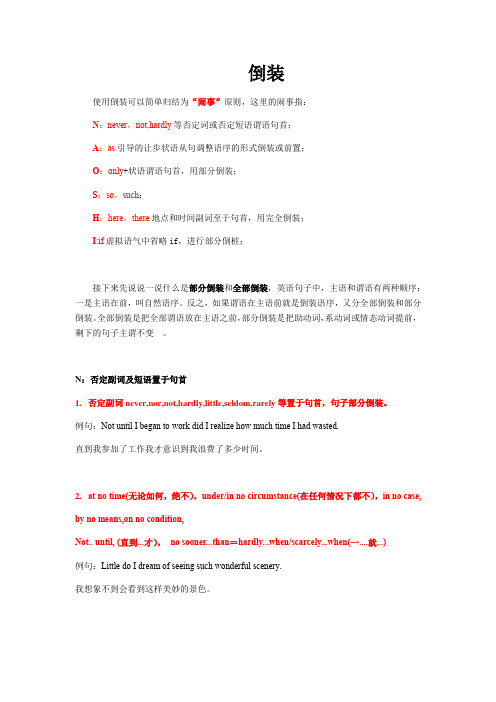
倒装使用倒装可以简单归结为“闹事”原则,这里的闹事指:N:never,not,hardly等否定词或否定短语谓语句首;A:as引导的让步状语从句调整语序的形式倒装或前置;O:only+状语谓语句首,用部分倒装;S:so,such;H:here,there地点和时间副词至于句首,用完全倒装;I:if虚拟语气中省略if,进行部分倒桩;接下来先说说一说什么是部分倒装和全部倒装,英语句子中,主语和谓语有两种顺序:一是主语在前,叫自然语序。
反之,如果谓语在主语前就是倒装语序,又分全部倒装和部分倒装。
全部倒装是把全部谓语放在主语之前,部分倒装是把助动词,系动词或情态动词提前,剩下的句子主谓不变。
N:否定副词及短语置于句首1.否定副词never,nor,not,hardly,little,seldom,rarely等置于句首,句子部分倒装。
例句:Not until I began to work did I realize how much time I had wasted.直到我参加了工作我才意识到我浪费了多少时间。
2.at no time(无论如何,绝不),under/in no circumstance(在任何情况下都不),in no case, by no means,on no condition,Not.. until, (直到...才),no sooner...than=hardly...when/scarcely...when(一....就...)例句:Little do I dream of seeing such wonderful scenery.我想象不到会看到这样美妙的景色。
A:由as引导让步状语从句要用部分倒装或前置。
句式为:表语/状语/动词原形+as+主语+其他,它只把强调的内容提到句首,主谓并不倒装,其中注意,如果从句的表语提前,且表语是名词,复数或不可数直接提前,后面句子照抄,如果是单数,冠词要省去。
特殊句式---倒装句 英语
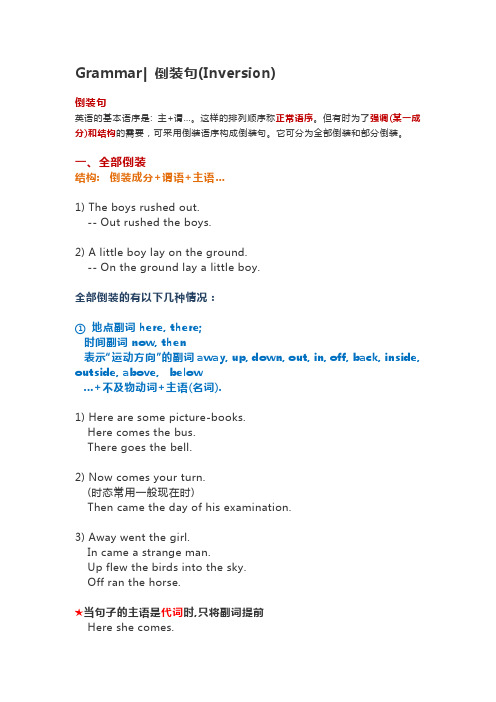
Grammar| 倒装句(Inversion)倒装句英语的基本语序是: 主+谓…。
这样的排列顺序称正常语序。
但有时为了强调(某一成分)和结构的需要,可采用倒装语序构成倒装句。
它可分为全部倒装和部分倒装。
一、全部倒装结构: 倒装成分+谓语+主语…1) The boys rushed out.-- Out rushed the boys.2) A little boy lay on the ground.-- On the ground lay a little boy.全部倒装的有以下几种情况:①地点副词here, there;时间副词now, then表示“运动方向”的副词away, up, down, out, in, off, back, inside, outside, above, below...+不及物动词+主语(名词).1) Here are some picture-books.Here comes the bus.There goes the bell.2) Now comes your turn.(时态常用一般现在时)Then came the day of his examination.3) Away went the girl.In came a strange man.Up flew the birds into the sky.Off ran the horse.★当句子的主语是代词时,只将副词提前Here she comes.Away she went.Out they ran.②表示地点的介词短语+不及物动词+主语(名词)1) Under the big tree sat some students.2) At the school gate stood a guard.3) On top of the hill stood a tower.On the wall hangs a large map.4) South of the city lies a big company.5) They arrived at the house, in front of which sat a little girl.★主语是代词时,不用倒装③表语(done, doing, adj, 介短) +连系动词+主语1) Gone was the days when Chinese people used "foreign oil".2) Present at the meeting were Professor Li and many other guests.3) Lying on the floor was a boy aged about seventeen.4) Seated on the ground are a group of young men playing cards.二、部分倒装结构: 倒装成分+助动词+主语+谓语…1) He was able to go to school only when the war was over.--Only when the war was over was he able to go to school.2) I will never forget it.-- Never will I forget it.部分倒装的有以下几种情况:①含有否定意义的词开头如: never, hardly, rarely, barely, seldom, little, few, nowhere, no sooner…(than), hardly/scarcely…(when)…,in no time(马上), at no time/ in no way/ in no case/ by no means(决不), not, not only…(but also)…, not until…, nothing, nobody等等1) Not a word did he say at the meeting.2) Never have I heard such a thing.Nothing did I see.3) Little did she say in the discussion.4) Hardly had he seen me when he ran away.5) Not only is he a scientist, but also he is a painter.6) Not until I received his letter did I learn anything about it.7) In no time will he come back.8) In no way should we forget history.★not 否定主语或not only…but also…连接两个主语时不用倒装1) Not a word was said.2) Not only you but also I will go there.3) Little work was done yesterday.②用于only所修饰的副词,介短, 状语从句开头时.1) Only in this way can we learn English well.2) Only then did I realize I made such a big mistake.3) Only by seizing every minute can we finish the work on time.4) Only when he got home did he know what happened to her.★但only 修饰主语时不用倒装1) Only some boys passed the math exam.2) Only Dr. Yang can save his life.③so/ neither/ nor+助动词+主语…表示甲…, 乙“也”/ “也不...”1) He went to college last year, (and) so did I.2) He has been to Qingdao, so have I.3) He could not do it, neither/ nor could I.4) After that we never saw her again, nor did we hear from her.★在so +主+助动, 表示同意对方的说法,意为“的确如此”.--Jim does well in Chinese.--so he does.--It is very hot today.-- Yes, so it is.★Neither…nor…连接的两个句子都要倒装;not only…but also…连接的两个句子时,not only后面的句子要倒装1) Neither has he called on her, nor will he do so.2) Not only shall we learn from books, but also we should learn form practice.④在so/such …(that…)结构中.so +adj/adv 或such (a/an) adj 名词+助动词+主语…1) The book is so interesting that all the children like it.--So interesting is the book that all the children like it.2) He spoke so loudly that everyone could hear him clearly.--So loudly did he speak that everyone could hear him clearly.3) It is such fine weather that we decide to go for an outing.--Such fine weather is it that we decide to go for an outing.⑤某些频度副词(often, many a time, always, now and then, every two hours等) 放在句首时.1) Often did we warn them not to do so.2) Always will we remember the importance of the meeting.3) Many a time has he given us good advice.4) Now and then does Jones go to the cinema.★其实,特殊疑问句也属于部分倒装。
句子的特殊句式有哪些
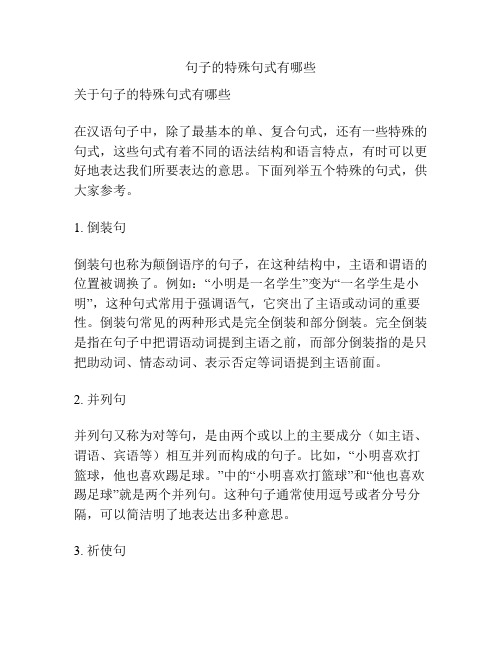
句子的特殊句式有哪些关于句子的特殊句式有哪些在汉语句子中,除了最基本的单、复合句式,还有一些特殊的句式,这些句式有着不同的语法结构和语言特点,有时可以更好地表达我们所要表达的意思。
下面列举五个特殊的句式,供大家参考。
1. 倒装句倒装句也称为颠倒语序的句子,在这种结构中,主语和谓语的位置被调换了。
例如:“小明是一名学生”变为“一名学生是小明”,这种句式常用于强调语气,它突出了主语或动词的重要性。
倒装句常见的两种形式是完全倒装和部分倒装。
完全倒装是指在句子中把谓语动词提到主语之前,而部分倒装指的是只把助动词、情态动词、表示否定等词语提到主语前面。
2. 并列句并列句又称为对等句,是由两个或以上的主要成分(如主语、谓语、宾语等)相互并列而构成的句子。
比如,“小明喜欢打篮球,他也喜欢踢足球。
”中的“小明喜欢打篮球”和“他也喜欢踢足球”就是两个并列句。
这种句子通常使用逗号或者分号分隔,可以简洁明了地表达出多种意思。
3. 祈使句祈使句也称为命令句,是表达命令、请求或建议的一种句型。
这种句子通常省略了主语,使用动词原形或者动词不定式,如:“过来!”、“请你帮我一下。
”、“不要挂断电话。
”这种句子通常灵活简洁,语气强烈,是生活中常用的一种句子结构。
4. 疑问句疑问句是指询问对方或自己是否了解某事的句子结构,其语调和词序都有所变化。
疑问句分为直接疑问句和间接疑问句。
直接疑问句是直接用疑问词提问,如“你在哪里?”而间接疑问句则由疑问句转述而来,如“我想知道你在哪里。
”5. 广义修饰句广义修饰句是由动词、形容词、副词、介词短语、不定式短语等修饰成分加上定语从句,构成一个复杂的修饰结构。
对于这种结构的句子,我们需要仔细分析句子成分之间的关系,找出主句和定语从句,才能完整理解其含义。
如:“他发现那个女孩,她和他小时候住在同一层楼。
”中的“那个女孩”是主句的宾语,而“她和他小时候住在同一层楼”是定语从句进一步修饰“那个女孩”。
文言文特殊句式
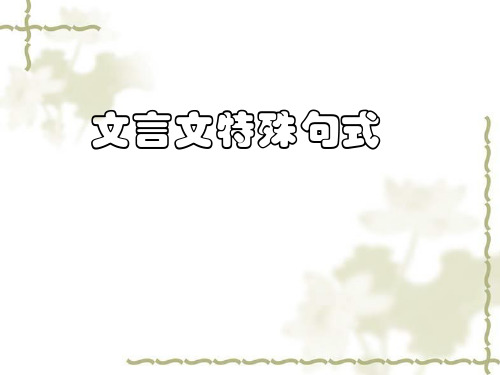
(四)、主谓倒装(强调谓语)
(1)甚矣,汝之不惠! (2)快哉此风!(《风赋》)
二、判断句
判断句是对事物的性质、情况、事物之 间的关系做出肯定或否定判断的句子。
廉颇者,赵之良将也。
城北徐公,齐国之美丽者也。 四人者,庐陵萧君圭君玉,长乐王回深父,……(王 安石《游褒禅山记》)
1、秦城恐不可得,徒见欺。……见(+动)。
2、臣诚恐见欺于王而负赵。 见……于+对象
3 吾不能举全吴之地受制于人。(受……于)
4、而君幸于赵王。 ……于……。
5、赢闻如姬父为人所杀
6、兔不可复得,而身为 宋国笑。
为……所…… (或……为所……)
……为……
7、荆州之民附操者,逼兵势耳。 无标志
8、风流总被雨打风吹去。 ……被……
四、省略句
①永之野产异蛇,黑质而白章,触草木,尽死。 ②尝与其父言兵事,奢不能难,然不谓善。 ③小大之狱,虽不能察,必以情。 ④一鼓作气,再而衰,三而竭 ⑤旦日,客从外来,与坐谈。 ⑥乃悟前狼假寐,盖以诱敌。(《狼》) ⑦死马且买之五百金,况生马乎? ⑧今以钟罄置水中。
1、把文言文阅读材料中画横线的句子翻 译成现代汉语。
(二)、状语后置
例:
①青,取之于蓝,而青于蓝。
②谨庠序之教,申之以孝悌之义,颁白者可以 不负戴于道路也。
③若亡郑而有益于君,敢以烦执事。
④虽董之后置 以“之”或“者”作标志。
(1)蚓无爪牙之利,筋骨之强。
(2)我持白璧一双,欲献项王; 玉斗一双,欲与亚父。
(3)计未定,求人可使报秦者,未得 (4)太子及宾客知其事者
• 4.太祖少机警有权术,而任侠放荡, 不治行业,故世人未之奇也;惟梁 国桥玄、南阳何颙异焉。玄谓太祖 曰:“天下将乱,非命世之才不能 济也,能安之者,其在君乎。”
高考语文文言文特殊句式——倒装句式

文言文句中,某些句子语 序与现代汉语不同,我们称之 为倒装句。其倒装现象主要有: 主谓倒装、宾语前置、定语后 置、状语后置等。
(一)主谓倒装
为了强调谓语,有时将谓 语置于主语之前。这仅仅是因 为语言表达的需要。例如:
甚矣,汝之不惠!(《愚 公移山》)
嘻!晏子之家若是其贫也! (《晏子春秋》)
见大王爱女牧羊于野,所 (代词,“之人”)不忍视。 《柳毅传》李朝威
是以后世无传焉,臣未之 闻也。《齐桓晋文之事》〈孟 子〉
保民而王,莫之能御也。 《齐桓晋文之事》〈孟子〉
而良人未之知也。《齐人 有一妻一妾》〈Biblioteka 子〉2.疑问代词宾语前置现象
文言文疑问句中,当使用 疑问代词做谓语动词(或介词) 的宾语时,该宾语往往要放在 谓语动词(或介词)的前面。 例如:
忌不自信《邹忌讽齐王纳 谏》〈战国策〉
然而不王者,未之有也。 《寡人之于国也》〈孟子〉
句读之不知,惑之不解, 或师焉,或不(否)焉。(之, 宾语提前的标志)《师说》
古之人不余欺也!《石钟 山记》苏轼
不吾知其亦已兮,苟(只 要)余情其信芳(美好)。 《离骚》屈原
东望愁泣,若不自胜。 《柳毅传》李朝
1.否定句中的宾语前置现 象
否定句中,当谓语部分被 否定副词修饰时,该谓语所带 宾语一般会前置。例如:
三岁贯汝,莫我肯顾。 (《硕鼠》)
“莫我肯顾”应理解成 “莫肯顾我”。
这样的否定副词一般有: “不”、“未”“毋”、 “无”、“莫”等。
再如:古之人不余欺也。 (不欺余)(苏轼《石钟山 记》)
吾孰与徐公美?《邹忌讽 齐王纳谏》〈战国策〉
以五十步笑百步,则何如? 《寡人之于国也》〈孟子〉
英语:特殊句式-倒装句

e.g. ① Never have I seen such a performance. ② Little does he realize the danger he is in. ③ Not only will help be given to the people to find jobs, but also medical treatment will be provided for the people who need it. 不但会帮助人们找工作,还会为那些需要的人提供医疗。 注:1. Hardly (Scarcely)…when, no sooner… than, not only…but also等引导两个分句时, 前一个分句用部分倒装,后一个分句不倒装。 e.g. Hardly had he begun to speak when his father stopped him. 2.neither…nor引导两个分句时,两个分句都要倒装。 e.g. Neither do I know it, nor does she. 3.not until …放在句首,如果until后面跟的是一个从句, 从句不要用倒装,主句要用部分倒装。 e.g. Not until his father came back did he begin to to do his homework.
3. 特殊倒装结构(详见后)
三、倒装结构的用法及注意点 1、完全倒装(将主语和谓语完全交换位置)
(1)一般疑问句句型(主系表结构) e.g. Is Mary a teacher? (2) 特殊疑问句句型(主系表结构) e.g. Who is that man ? (3) There be 句型(除be之外,能与there 连用的动词还有 seem, exist, happen, appear , live, stand等) e.g. ① There are 50 students in the class. ② There stands a tall tree in front of the house.
初高中衔接英语中的特殊句式之倒装句课件

2.常考的引起部分倒装的条件:
(7) “一...就...”no sooner...than.../hardly...when...结构的倒装。
改写:As soon as she rushed out of the house, tears of regret rolled down her cheek. 她一冲出家门,悔恨的泪水就顺着脸颊滚落下来。
2.常考的引起部分倒装的条件:
(8) “也(不)是”的倒装 ”so/neither+助动词/情态动词/be动词 +主语(代词)” 正常语序: He doesn’t like eating apples. I didn’t like eating apples, either. 不喜欢吃苹果。我也不喜欢。 倒装语序:He doesn’t like eating apples. Neither do I.
No sooner had I arrived at home than the phone rang. 6.如果我有钱,我就买下它。
Had I mony, I would buy it.
改写:We can do it better only in this way.只有这样我们才能做的更好。
Only in this way can we do it better.
He admitted his mistake only after the fault was pointed out. 只有错误被指出后,他承认了自己的错误。 Only after the fault was pointed out, did he admit his mistake.
特殊句式之倒装句)

【5】数量词做定语多放在中心词后面。格式:
中心语+数量定语
译文:“等到了陈这个地方,有六七百辆车,千多名骑兵, 数万名士兵”
①比至陈,车六七百乘,骑千余,卒数万人。
②一食或尽粟一石(《马说》) 译文:“吃东西有时能吃完一石粮食”
练习评讲
• 1.太子及宾客知其事者皆白衣冠以送之 《战国策•荆何刺秦王》 定语后置句 • 2. 国之孺子之游者(《勾践灭吴》) 定语后置句 吴国出游的年青人 • 3.具告以事。 《鸿门宴》 状语后置句 • 4.四方之士来者。(《勾践灭吴》) 定语后置句 四方前来投奔吴国的士人 • 5. 青,取之于蓝,而青于蓝 《劝学》状语后置句 • 6.美哉,我少年中国。 《少年中国说》 主谓倒装句 • 7.苟全性命于乱世,不求闻达于诸侯 《出师表》 状语后置句 • 8.荆州之民附操者。(《赤壁之战》)定语后置句 荆州依附曹操的老百姓 • 9.军书十二卷,卷卷有爷名 《木兰辞》定语后置句 • 10.不仁哉!梁惠王也 。 《孟子•尽心下》主谓倒装句
③覆之以掌 (《促织》)
们反复讲述”
译文:“用手掌覆盖(蟋蟀)”
(2)格式:动+于(乎,相当“于”)+宾 ①能谤讥于市朝 (《邹[zou1]忌讽齐王纳谏》)译指文出:我“的能过够错在的集人市”上 ②且立石于其墓之门(《五人墓碑记》)译文:“并且在他们的墓门前建立石碑” ③生乎吾前 (《师说》)译文:“生在我的前面”
为了强调谓语,有时将谓语置于主语之前。这仅仅是因为语言表 达的需要。
①甚矣,汝之不惠(慧)! (《愚公移山》)译文:“你太不聪明了” ②安在公子能急人之困。(《信陵君窃符救赵》)
译文:“公子能为别人困难而急的地方在哪里呢?”(安:<疑问 代词>表处所,哪里;什么地方)
文言特殊句式——倒装句 优秀(课堂PPT)

① 还矢先王,而告以成功。
迁
② 请其矢,盛以锦囊。
移
训
③ 方其系燕父子以组。
练
④ 申之以孝悌之义。
⑤ 覆之以掌。
⑥ 请奉命求救于孙将军。
⑦ 能谤讥于市朝。
⑧ 且立石于其墓之门。
⑨ 长于臣。
⑩ 虽才高于世,而无骄尚之情。
① 还矢先王,而告以成功。
迁
② 请其矢,盛以锦囊。
移
③ 方其系燕父子以组。
②②以以为为莫莫己己若若。。
③③古古之之人人不不余余欺欺也也。。
④④然然而而不不王王者者,,未未之之有有也也。。 第一,宾语必须是代词; 第二,必须是否定句
“不、未、毋(无) 、莫……”。
否定词+代词+动词
迁
①三岁贯汝,莫我肯顾。
移
训
②时人莫之许。
练
③秦人不暇自哀。
④我无尔诈,尔无我虞。
⑤人君无愚智贤不肖,莫不欲求 忠以自为,举贤以自佐。
判 断被 句动
省 略 句
倒 装 句
句
主 宾定 状
倒谓倒装句语 前类型语 后
语 后
装 置置 置
(一)主谓倒装
为了强调谓语,把谓语放在主语之前。
例: 1.甚矣,汝之不惠!《愚公移山》 汝之不惠甚矣 2.快哉此风!《风赋》 此风快哉
现代汉语:
动词 + 宾语
介词 + 宾语
•宾语前置句一般就发生在这两种条件下。
迁 )移
训 练
答案:C(C项为状语后置句,其余为定 语后置句)
(四)状语后置
现文代言汉文语中:状语常常后置:
[状语] +谓语
处于补语的成分往往要以状语来理解。
初中文言文特殊句式

初中文言文特殊句式1. 倒装句:把谓语动词放在主语之前的句子结构,例如:"子曰,知者不惑也。
"(孔子说,知道的人不会迷惑。
)2. 比拟句:用"如同","犹如"等词语表示比较,例如:"贪婪之心犹如风中之火。
"3. 并列句:用"与","或"等词语连接两个或多个并列的词、短语、从句,例如:"辛勤劳动,与知识相结合,方能获得成功。
"4. 定语从句:用"之","者","所"等代词引导的修饰性从句,例如:"知识是人类进步的阶梯。
"5. 状语从句:用"因","所以","然则"等引导的修饰性从句,例如:"因为努力学习,所以取得了好成绩。
"6. 反问句:用反问的方式表达疑问、反问的句子,例如:"人生何以为快乐?岂止于富有与权势乎?"7. 折叠句:通过重复的方式表达强调,例如:"文武之道,一张一弛也。
"8. 直接引语:直接引用别人的话语,常用于引述他人的观点或对话,例如:"他说道:“无论经历多少挫折,我都不会放弃。
”"9. 比喻句:用一个物体或事物来比喻另一个物体或事物,例如:"人的一生就像一本书,每一页都记录着不同的经历。
"10. 排比句:通过重复相同结构的句子或短语,形成一种韵律感,例如:"疾风知劲草,板荡识诚臣。
"。
英语特殊句式语法

英语特殊句式语法英语语法中存在一些特殊的句式结构,它们具有独特的语法规则和用法。
在本文中,我们将介绍一些常见的英语特殊句式,并通过示例来解释它们的用法。
一、倒装句倒装句是英语中常见的特殊句式之一,它采取了主语和谓语动词的位置颠倒。
倒装句的用法多种多样,下面是一些常见的情况:1. 完全倒装:当句子以表示地点状态的副词(如here, there, now, then等)开头时,需要完全倒装。
例如:Here comes the bus.There goes my hat.2. 部分倒装:在某些特定的条件下,主语和谓语动词的位置需要部分颠倒。
a. 在用于表示否定的副词或短语(如never, seldom, hardly, not until 等)开头的句子中,需要将助动词或情态动词与主语颠倒。
例如:Never have I seen such a beautiful sunset.Not until she left did I realize how much I loved her.b. 在以表示条件的状语从句(如if, unless, whether等)开头的句子中,需将助动词和主语颠倒。
例如:If only I had more time, I would travel around the world.Whether it rains or not, we will go camping.二、虚拟语气虚拟语气是英语中常见的特殊句式之一,用于表示与事实相反、假设或愿望等情况。
以下是虚拟语气的几种常见形式:1. 虚拟条件句:用于表示与事实相反的假设情况,包括类型1、类型2和类型3三种类型。
a. 类型1:表示真实可能发生的假设例如:If she studies hard, she will pass the exam.b. 类型2:表示与事实相反,但在理论上有可能实现的假设例如:If I were you, I would quit that job.c. 类型3:表示与过去事实相反的假设例如:If I had studied harder, I would have passed the exam.2. 虚拟表达愿望例如:I wish I could play the piano like a professional.3. 虚拟表达建议、命令等例如:The teacher suggested that they should review the material again.三、强调句强调句是一种特殊的句式,它通过强调句子中的某个成分来表达特殊的意义。
初中文言文特殊句式之倒装句
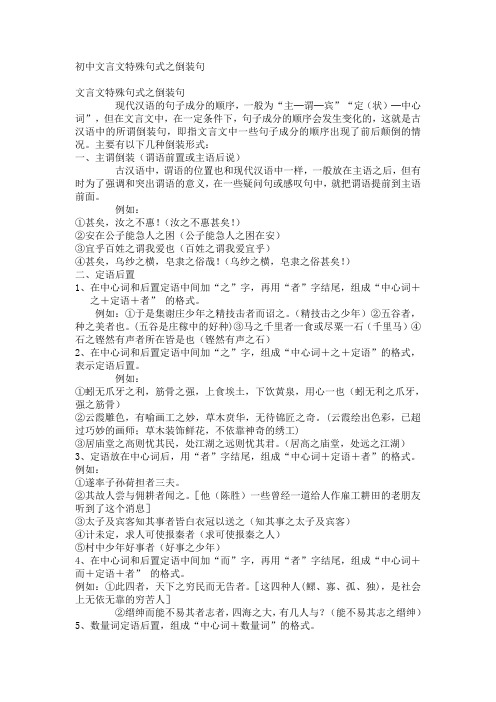
初中文言文特殊句式之倒装句文言文特殊句式之倒装句现代汉语的句子成分的顺序,一般为“主─谓─宾”“定(状)─中心词”,但在文言文中,在一定条件下,句子成分的顺序会发生变化的,这就是古汉语中的所谓倒装句,即指文言文中一些句子成分的顺序出现了前后颠倒的情况。
主要有以下几种倒装形式:一、主谓倒装(谓语前置或主语后说)古汉语中,谓语的位置也和现代汉语中一样,一般放在主语之后,但有时为了强调和突出谓语的意义,在一些疑问句或感叹句中,就把谓语提前到主语前面。
例如:①甚矣,汝之不惠!(汝之不惠甚矣!)②安在公子能急人之困(公子能急人之困在安)③宜乎百姓之谓我爱也(百姓之谓我爱宜乎)④甚矣,乌纱之横,皂隶之俗哉!(乌纱之横,皂隶之俗甚矣!)二、定语后置1、在中心词和后置定语中间加“之”字,再用“者”字结尾,组成“中心词+之+定语+者” 的格式。
例如:①于是集谢庄少年之精技击者而诏之。
(精技击之少年)②五谷者,种之美者也。
(五谷是庄稼中的好种)③马之千里者一食或尽粟一石(千里马)④石之铿然有声者所在皆是也(铿然有声之石)2、在中心词和后置定语中间加“之”字,组成“中心词+之+定语”的格式,表示定语后置。
例如:①蚓无爪牙之利,筋骨之强,上食埃土,下饮黄泉,用心一也(蚓无利之爪牙,强之筋骨)②云霞雕色,有喻画工之妙,草木贲华,无待锦匠之奇。
(云霞绘出色彩,已超过巧妙的画师;草木装饰鲜花,不依靠神奇的绣工)③居庙堂之高则忧其民,处江湖之远则忧其君。
(居高之庙堂,处远之江湖)3、定语放在中心词后,用“者”字结尾,组成“中心词+定语+者”的格式。
例如:①遂率子孙荷担者三夫。
②其故人尝与佣耕者闻之。
[他(陈胜)一些曾经一道给人作雇工耕田的老朋友听到了这个消息]③太子及宾客知其事者皆白衣冠以送之(知其事之太子及宾客)④计未定,求人可使报秦者(求可使报秦之人)⑤村中少年好事者(好事之少年)4、在中心词和后置定语中间加“而”字,再用“者”字结尾,组成“中心词+而+定语+者” 的格式。
高中英语语法:特殊句式 之倒装句
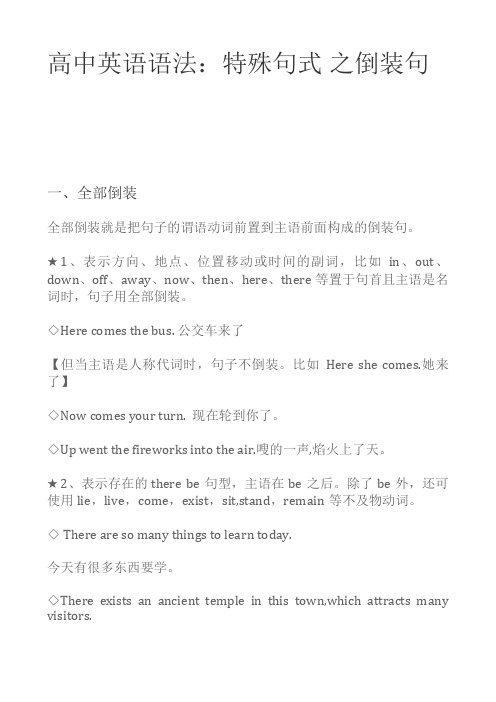
高中英语语法:特殊句式之倒装句一、全部倒装全部倒装就是把句子的谓语动词前置到主语前面构成的倒装句。
★1、表示方向、地点、位置移动或时间的副词,比如in、out、down、off、away、now、then、here、there等置于句首且主语是名词时,句子用全部倒装。
◇Here comes the bus. 公交车来了【但当主语是人称代词时,句子不倒装。
比如Here she comes.她来了】◇Now comes your turn. 现在轮到你了。
◇Up went the fireworks into the air.嗖的一声,焰火上了天。
★2、表示存在的there be句型,主语在be之后。
除了be外,还可使用lie,live,come,exist,sit,stand,remain等不及物动词。
◇ There are so many things to learn today.今天有很多东西要学。
◇There exists an ancient temple in this town,which attracts many visitors.这个镇上有一个古代庙宇,吸引着许多游客。
3、介词短语放在句首作状语,谓语动词是lie, stand , sit ,exist , stretch , come等或系动词be,主语是名词时。
◇At the foot of the mountain lies a clean stream.山脚下有一条清澈的小溪。
4、代词such放在句首,句子的谓语动词是be。
◇Such is what he wanted.这就是他想要的。
5、为了保持句子平衡,使上下文紧密街接,常将表语和状语放在句首,引起主语和谓语的倒装。
◇Gone are the days when we used foreign oil.我们用“洋油”的时代一去不复返了6、现在分词、过去分词、形容词、副词等有时可移到句首,来对动作或状态加以强调。
- 1、下载文档前请自行甄别文档内容的完整性,平台不提供额外的编辑、内容补充、找答案等附加服务。
- 2、"仅部分预览"的文档,不可在线预览部分如存在完整性等问题,可反馈申请退款(可完整预览的文档不适用该条件!)。
- 3、如文档侵犯您的权益,请联系客服反馈,我们会尽快为您处理(人工客服工作时间:9:00-18:30)。
高考英语语法复习专题------ 特殊句式一、考点聚焦倒装句部分倒装1. 否定意义的词或短语,位于句首,需部分倒装。
如否定词no, not, never;半否定词hardly, seldom, scarcely, barely, rarely, little, few;no合成的代词或副词nobody, nothing, nowhere;否定的短语not until, by no means, in no way, in no time, under no circumstances。
No word did he say before he left.Never had I heard or seen such a thing.Little did I know about it.Nowhere will you find better roses than theses.Not until he went abroad did he know the truth.By no means shall we give up.2. not only (merely, alone, simply)…(but) also 连接两个并列分句,前一分句需倒装。
Not only did we lose our money, but we also came close to losing our lives.Not simply is this book interesting but also instructive.注意:Not only you but also I(连接并列主语不倒装)will attend the meeting.3. neither…nor连接两个并列分句,前后两个分句都倒装。
Neither did they write nor did they telephone.Neither is he wrong nor are you.Neither could I help you, nor could he.Neither French nor German do I know.Neither on Saturday nor on Sunday do we have lessons.注意:Neither you nor I(连接并列主语不倒装)like this book.4. Only + 状语,位于句首,需部分倒装。
Only when I got there did I know the truth.Only in the morning can you meet him.Only him did I see yesterday.注意:Only Li Lei(修饰主语不倒装)can answer this question.5. 在含有were, had, should的if虚拟条件句中,省略if,将were, had, should移到句首,需部分倒装。
Were he here, we would have no difficulty with it.Had you worked hard, you would have finished it early.Should it rain, the crops would be saved.6. as / though引导让步状语从句时,用部分倒装。
Old as / though he is, he works like a young man.Much as I admire her, I can’t forgive her faults.Try again as / though he will, he can’t succeed.In the classroom as / though he stays, he doesn’t read his texts.注意:Child as / though he is, he knows much about the society.(表语是单数可数名词,倒装时省略名词前的a/an)7. so…that…和such…that…引导状语从句,当so或such提到句首时,主句需用倒装语序。
So interesting is that story that everyone wants to read it.So good a girl is she that we all like her.Such a good girl is she that we all like her.8. to such an extent, to such a degree, to such lengths介词短语位于句首时,需倒装。
To such lengths did he speak that everyone got bored.To such an extent did they fight that they broke up.9. so 位于后一分句句首,表示“也一样”,需倒装。
He has been to Beijing, and so have I.Tom will go there next summer, and so will I.He can speak French. So can I.She respected me. So did I.Rock music is OK, and so is skiing.10. neither, nor, no more 位于后一分句句首,表示“也不”,需倒装。
He didn’t see the film, neither did she.I don’t enjoy singing, nor did I like puter games.She is not into music, nor am I.He can’s drive a car. No more can I.11. be动词引导的让步状语从句需倒装。
Be he rich or poor, I will love him for the rest of my life.12. as引导的方式状语从句中,可采用倒装,也可不用。
My uncle, as did other hunters, had a dog team.He was honest and diligent, as were most of his classmated.13. 在比较状语从句中因主语较长,或带有较长的修饰语时可倒装,也可不用。
He ran as fast as did the person who came from England.American consumed more energy than did our country.完全倒装—即将谓语移到主语前1. 以here, there, now, then或out, in, up, down, off, away, below, back 等方向性副词开头的句子,需完全倒装。
Here es the bus.Now es your turn.Then came a new difficulty.In came an old man with a white beard.Out rushed a cat from under the table.Off went the horse.注意:The door opened and in she came.Here you are.Out he rushed. (主语为代词不倒装)2. 表地点的介词短语位于句首,需完全倒装。
Around the lake are some tall tree.At the end of the valley lies a small lake.Under the table sleeps a brown cat.3. 表语位于句首时,需完全倒装。
Seated on the ground are a group of young people.Hanging on the wall was a painting by Qi Baishi.Gone are the days when we were together.Happy are those who are contended.注意:在表语置于句首的倒装结构中,要注意其中的谓语应与其后的主语保持一致,而不是与位于句首的表语保持一致。
二、精典名题导解1..—David has made great progress recently.—_______, and __________.A.So he has; so you haveB.So he has; so have youC.So has he; so have youD.So has he; so you have解析:答案为B。
本题考查倒装知识。
“So + 主语+ 助动词”表“确实如此”,“So + 助动词+ 主语”表“也一样。
”2.—I would never ever e to this restaurant again. The food is terrible!—.A. Nor am IB. Neither would IC. Same with meD. So do I解析:答案为B。
本题主要考倒装,以so/nor/neither开头的倒装句子,在时态、语态、助动词、情态动词等谓语形式上,要尽可能与上文一致,故选B,排除A、D。
如说“I t’s the same with me”也可,但不能省略“the”。
3. snacks and drinks, but they also brought cards for entertainment when they had a piic in forest.A. Not only they broughtB. Not only did they bringC. Not only brought theyD. Not only they did bring解析:答案为B。
此题考查倒装句的用法not only…but等有否定意义的连词及副词位于句首,句子使用部分倒装,故选B。
基础训练1. Not until I began to work ____ how much time I had wasted.A. didn’t I realizeB. did I realizeC. I didn’t realizeD. I realized2. Only by practising a few hours every day ____ be able to master the language.A. you canB. can youC. you willD. will you3. If you don’t go, neither ____.A. shall IB. do IC. I doD. I shall4. No sooner ____ to the station ____ the train left.A. had I got, whenB. I had got, thanC. had I got, thanD. did I get, when5. ---- Your father is very strict with you. ---- ____. He never lets off a single mistake of oursA. So he isB. So is heC. He is soD. So does he6. ____ today, he would get there by Sunday.A. Would he leaveB. Was he leavingC. Were he to leaveD. If he leave7. Never in my life ____ such a thing. A. I have heard or have seenB. have I heard or seenC. I have heard or seenD. did I hear or see8. ---- Here ____! Where is Xiao Liu? ---- There ____.A. es the bus, is heB. es the bus, he isC. the bus es, is heD. the bus es, he is9. ____ , I will not buy it.A. Much as do I like itB. As much I like itC. Much as I like itD. As I like it much10. ---- I like football. I don’t like volleyball.---- ____.A. So do IB. Neither do IC. So it is with meD. So is it with me11._____ the expense, I _____ to Italy.A. If it were not, goB. Were it not for, would goC. Weren't it for, will goD. If it hadn t been, would have gone12. So _____ in the darkness that he didn' t dare tomove an inch.A. he was frightenedB. was he frightenedC. frightened he wasD. frightened was he13.—In modem times, girls like beautiful clothes.—Yes, _____ and boys. After all, our life has greatly improved.A. so do they; so do youB. so they do; so you doC. so do they; so you doD. so they do; so do you14.—You have an English class every day exceptSunday. --- _____.A. So we haveB. So we doC. So have weD. So do we15.1 wonder if your wife will go to the ball. If your wife _____, so _____ mine.A. does; willB.will; doesC.will; wouldD.does; do16. Only after I read the text over again _____ its main idea.A. that I knewB.did I knewC. 1 could knowD. I did know17.—You seem to have learned all the English words by heart.A.Sol doB.SodolC. So I haveD. So have 118. —I seldom watch TV, but listen to the radio a lot.A. So do IB. Neither do IC. I m the sameD. So it is with me19. So excited _____ that he couldn't say a word.A. he seemedB. did he seemC. was he seemingD. he did look20. Jimmy was so nervous not a single word _____ down in the dictation.A. he wroteB. he was writtenC. did he writeD. was he written21. Little ______ when 1 took the trip where it would lead me.A. have I knownB. had I knownC. do 1 knowD. did I know22. —Have you ever seen anything like that before?—____.A. No, I never have seen anything like that beforeB. No, never I have seen anything like that beforeC. No, never have 1 seen anything like that beforeD. No, I have seen anything like that before never23. _____ , 1 would accept the invitation and go to the party.A. Were I youB. Was I youC. Had I been youD. Would 1 be you24. You should work less _____.A. and neither should IB. and so should IC. and nor should ID. and so I should25. _____ and caught the mouse.A. Up the cat jumpedB. The cat up jumpedC. Up jumped the catD. Jumped up the cat26. Not only _____ a promise, but also he kept it.A. did he makeB. he madeC. does he makeD. has he made27. His uncle is a worker and has been working in the factory for more than ten years. _____.A. So is his auntB. So has his auntC. So his aunt doesD. So it is with his aunt28. Not once _____ their plan.A. did they changeB. they changedC. changed theyD. they did change29.—Do you know Jim quarreled with his brother? —I don't know, and ______ .A. nor don't I careB. nor do I careC. I don't care neitherD. I don't care also30. Not until he arrived home _____ he find that this wallet had been stolen.A. didB. wouldC. whenD. that31. —This is one of the oldest trees in the world.— _____ such a big tree.A. Never I have seenB. I haven't never seenC. Never have I seenD. I have seen never32. Nowhere else in the world _____ cheaper tailoring(裁缝业, 成衣业)than in Hong Kong.A. a tourist can findB. can a tourist findC. a tourist will findD. a tourist has found33. _____ succeed in doing anything.A. Only by working hard we canB. By only working hard we canC. Only we can by working hardD. Only by working hard can we34. _____ that we all went out, lying in the sun.A. So fine was the weatherB. So was the fine weatherC. The weather was so fine wasD. So the weather was tine35. ____ a nice man ____ that we all believe him.A. So; did he seemB. So; he seemedC. Such; he seemedD. Such; did he seem36. —You seem to be an actor.—_____. I have played many parts in a lot offilms.A. So do IB. So am IC. So I doD. So I am37. Not only____ working hard, but also ____ very polite.A. the boy is; he isB. is the boy; he isC. the boy is; is heD. is the boy; is he38. _____ , he never seems able to do the work beautifully.A. Try as he doesB. As he triesC. Try as does heD. As try he does39.—I cannot see the picture well from here. — _____.A. Neither can t IB. Neither I canC. I can't neitherD. Neither can I40.— You ought to have given them some advice— _____, but who cared what I asked?A. So ought youB. So 1 oughtC. So it wasD.So I did41. So carelessly _____ that he almost killed himself.A. he drivesB. does he driveC. did he driveD. he drove42. Little _____ about his own health though he was very ill.A. he caredB. did he careC. he caresD. does he care43. Well ____ know him and well ____ know me.A. I did; he didB. did I; he didC. did I; did heD. I did; did he44. No sooner ____ they rushed out into the street.A. did they hear the news thanB. did they hear the news whenC. had they heard the news thanD. had they heard the news when45. Little wonder _____ up their hands in dismay.A. have some thrownB. some have thrownC. thrown some haveD. have thrown some46. _____ , he would have passed the exam.A. If he were to studyB. If he studied hardC. Had he studied hardD. Should he study hard47. We were lucky enough, for no sooner _____ home _____ it rained.A. we returned; andB. we had returned; whenC.did we return; whenD. had we returned; than48. So little _____ agree on the plan that they could not settle their difference.A. did theyB. do theyC. they didD. they did not49. _____ he realized it was too late to return home.A. No sooner it grew dark thanB. Hardly did it grow dark whenC. It was not until dark thatD. It was until dark that强化训练1. For a moment nothing happened. Thenall shouting together.A. voices had eB. came voicesC. voices would eD. did voices e2.The puter was used in teaching. As a result, not only _________, but students became more interested in the lessons.A. saved was teachers’ energyB. was teachers’ energy savedC. teachers’ energy was savedD. was saved teachers’ energy3. So sudden ________that the enemy had no time to escape.A. did the attackB. the attack didC. was the attackD. the attack was4. Little about her own safety, though she was in great danger herself.A. did Rose careB. Rose did careC. Rose does careD. does Rose care5. Not until I came home last night ________ to bed.A. Mum did goB. did Mum goC. went MumD. Mum went6. Unsatisfied _________with the payment, he took the job just to get some work experience.A. though was heB. though he wasC. he was thoughD. was he though7. It was announced that only when the fire was under control to return to their homes.A. the residents would be permittedB.had the residents been permittedC. would the residents be permittedD. the residents had been permitted8. Only when I left my parents for Italy how much I loved them.A.I realizedB.I had realizedC.had I realizedD.did I realize9. Bill wasn’t happy about the delay of the report by Jason,and ______.A. I was neitherB. neither was IC. I was eitherD. either was I10.you eat the correct foods be able to keep fit and stay healthy.A.Only if;will youB.Only if;you willC.Unless;will youD.Unless;you will11.—How was the televised debate last night?—Super!Rarelyso much media attention.A.a debate attractedB.did a debate attractC.a debate did attractD.attracted a debate12. Littlethat we were watching his every move,so he seemed to be going his own way in this business.A.he realizedB.he didn’t realizeC.didn’t he realizeD.did he realize13. —Father,you promised!—Well,.But it was you who didn’t keep your word first.A.so was IB.so did IC.so I wasD.so I did14. —I would never e to this restaurant again.The food is terrible!—.A.Nor am IB.Neither would IC.Same with meD.So do I15.,his idea was accepted by all the people at the meeting.A.Strange as might it soundB.As it might sound strangeC.As strange it might soundD.Strange as it might sound16. I have been living in the United States for twenty years,but seldomso lonely as now.A.have I feltB.I had feltC.I have feltD.had I felt17.—My room gets very cold at night.—.A.So is mineB.So mine isC.So does mineD.So mine does18. Never in my wildest dreamsthese people are living in such poor conditions.A.I could imagineB.could I imagineC.I couldn’t imagineD.couldn’t I imagine19. At the foot of the mountain.A.a village lieB.lies a villageC.does a village lieD.lying a village20. Only thenhow much damage had been caused.A.she realizedB.she had realizedC.had she realizedD.did she realize21. about wild plants that they decided to make a trip to Madagascar for further research.A.So curious the couple wasB.So curious were the coupleC.How curious the couple wereD.The couple was such curious22. Never beforein greater need of modern public transport than it is today.A.has this city beenB.this city has beenC.was this cityD.this city was23. They have a good knowledge of English but littlethey know about German.A.haveB.didC.hadD.do24. —Did Linda see the traffic accident?—No,no soonerthan it happened.A.had she goneB.she had goneC.has she goneD.she has gone25. homework did we have to do that we had no time to take a rest.A.So muchB.Too muchC.Too littleD.So little26. —It’s burning hot today,isn’t it?— Yes.yesterday.A.So was itB.So it wasC.So it isD.So is it27. I’ve tried very hard to improve my English.But by no meanswith my progress.A.the teacher is not satisfiedB.is the teacher not satisfiedC.the teacher is satisfiedD.is the teacher satisfied28. ,he talks a lot about his favorite singers after class.A.A quiet student as he may beB.Quiet student as he may beC.Be a quiet student as he mayD.Quiet as he may be a student29. Under no circumstances, I was warned, _________ to give the password to someone else.A. could IB. I couldC. I wasD. was I30. Woman ___ Hillary Clinton is, she was bold enough to participate in the presidential campaign, 2008.A. whoB. asC. thatD. like31. The old couple have been married for 50 years and never oncewith each other.A. they have quarreledB. they quarreledC. have they quarreledD. had they quarreled32. Muchhe states he has a good taste of his own,he can’t avoid being influenced by advertisement.A. thatB. whichC. asD. /33. Hardly had all the points that the teacher taughtdown when the bell rang.A. to be takenB. takingC. takenD. been taken34.—Is everyone here?—Not yet. Look, there_______ the rest of our guests!A. eB. esC. is ingD. are ing35. John opened the door. There _____ he had never seen before.A. a girl did standB. a girl stoodC. did a girl standD. stood a girl高考训练1.At the meeting place of the Yangtze River and Jialing River,one of the largest cities in China.A.lies ChongqingB. Chongqing liesC. does lie ChongqingD. does Chongqing lie2. Distinguished guests and friends, wele to our school.the ceremony of the 50th Anniversary this morning are our alumni(校友)from home and abroad.A. AttendB. To attendC. AttendingD. Having attended3. I travel to the Binhai New Area by light railway every day,do many businessmen who live in downtown Tianjin.A. asB. whichC. whenD. though4. Hearing the dog barking fiercely, away.A. fleeing the thiefB. was fleeing the thiefC. the thief was fleeingD. fled the thief5. Out, with a stick in his hand.A. did he rushB. rushed heC. he rushedD. he did rush6. the plane.A. Flew downB. Down flewC. Down was flyingD. Down fly7. I had time, I would have run around the lake again.A. IfB. UnlessC. HadD. When8. I ten years younger, I would be able to clime the too of the mountain.A. AmB. WasC. WereD. Be9. In front of the farmhouse.A. lay a peasant boyB. laid a peasant boyC. a peasant boy layD. did a peasant boy lie10. On the river bankwhere he once lived.A. stand a houseB. a house standsC. does a house standD. stands a house11. Such a noisethat I couldn’t make myself heard.A. are thereB. there isC. was thereD. there are12. Outafter the door was opened.A. did the dog runB. ran the dogC. the dog ranD. does the dog run13. time, they would certainly e and help us.A. If had theyB. If they hadC. Had theyD. both B and C14. Look!.A. There does Jane eB. There es JaneC. There is Jane ingD. Jane is there ing15. hot is the sun that we cannot go out at present.A. VeryB.TooC. SoD. Such16. and caught the mouse.A. Up the cat jumpedB. The cat up jumpedC. Up jumped the catD. Jumped up the cat17., I would have phoned you.A. If I knew itB. Had I known itC. If I know itD. Did I know it18. the rain stop, the crops would be saved.A. DidB. ShouldC. WouldD. Will基础题答案1~5 BDACA 6~10 CBBCC 11~15 BDDBA 16~20 BADBC 21~25 DCABC26~30 ADABA 31~35 CBDAD 36~40 DBADD 41~45 CBCCB 46~49 CDAC强化题答案1-5 BBCAB 6-10 BCCBA 11-15 BDDBD 16-20 ACBBD21-25 BADAA 26-30ADBDB 31-35CCDBD高考题答案1-5ACADC6-10 BCCAD 11-15CBBBC 16-18CBB。
